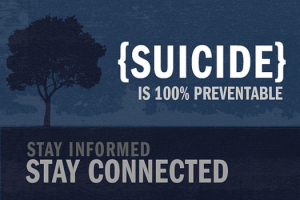 It is essential to understand the signs and symptoms of increased suicide risk. I am writing this article because September is National Suicide Awareness & Prevention Month. In future blog posts, I will be writing a series on how to properly open a conversation with someone who is potentially suicidal. I will also discuss how to get them the help they deserve and require.
It is essential to understand the signs and symptoms of increased suicide risk. I am writing this article because September is National Suicide Awareness & Prevention Month. In future blog posts, I will be writing a series on how to properly open a conversation with someone who is potentially suicidal. I will also discuss how to get them the help they deserve and require.
Know The Warning Signs For Suicide Severely depressed and suicidal people do not always appear suicidal. Their pain may be hidden. However, in most cases, at least some of these signs and symptoms will be present. Being aware of what to look for will help you increase the odds of being able to help a friend, family member, or even yourself, when help is most desperately needed. If any of these signs are present or you suspect a person is in imminent danger of hurting themselves, please call 911 immediately. You can also contact the National Suicide Prevention Lifeline at 1-800-273-8255. Never second guess yourself or worry that you’re overreacting. Saving a life is always worth it!
Critical Signs Of Potential Suicide: If you learn of any of these signs, it is important to act quickly. Please call 911 or go directly to the nearest emergency room.
- A person is in the act of self-harm
- A person has access (or is looking for access) to a weapon, pills, or other means of hurting themselves
- A person is talking about or threatening to hurt or kill themselves
- A person is expressing thoughts about death, dying, or suicide.
- Other Warning Signs Of Potential Suicide:
- Hopelessness
- Rage, uncontrolled anger,
- Acting reckless or engaging in risky activities, seemingly without thinking
- Feeling trapped – like there’s no way out
- Feeling like there is no sense of purpose or meaning to life
- Increased alcohol or drug use
- Withdrawing from friends, family and society
- Anxiety, agitation, unable to sleep or sleeping all the time
- Dramatic and sudden mood changes
- Lack of self-care or hygiene
- Ignoring or neglecting doctor’s orders
- Saying goodbyes
- Giving away possessions
- Getting affairs in order
My name is Amanda Itzkoff, MD. I am a New York City based Psychiatrist and Assistant Professor at Mount Sinai Medical Center. For additional information about suicide prevention or other mental health issues, please feel free to email our office at Amanda.Itzkoff@gmail.com . To schedule an appointment, call our offices at 917-609-4990.
Be Well!
Amanda Itzkoff, MD

